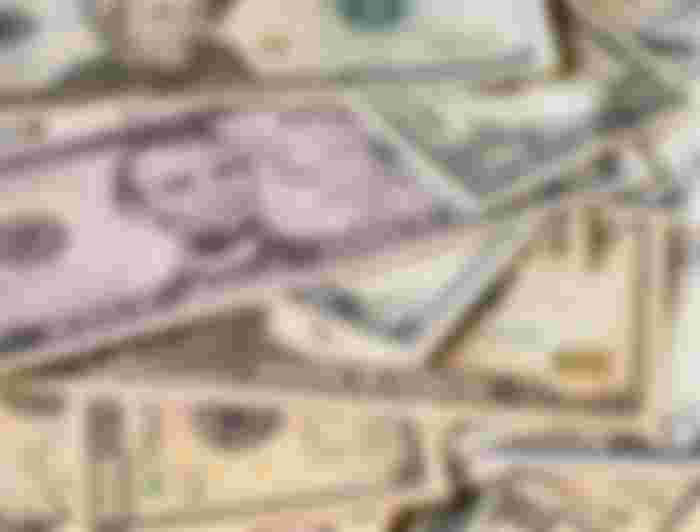This may be the first time I ever talk about religion on my read.cash account. But hey, I love exploring topics I haven't touched yet, so why not?
A confession
And so this article starts with a confession: I am a Christian. Admittedly, not a very good Christian, because I am full of vice and sin (mostly ones of sexual nature), but still, I identify as a Christian, and believe that there is only one God, and that Jesus Christ is his son, who came down to Earth to redeem humanity. I'm not just any Christian - I'm a Lutheran. I believe that while humans possess free will, all humans are inherently sinful and tainted by the original sin, thus our salvation is unearned, and only granted by God's grace.

As anyone who frequently reads my articles knows, I am not too fond of Statism to say the least. There is both a personal angle to it, and a religious angle.
The personal one is that the more powerful the government is, the more chance it has of going full 1984, arresting people for thoughtcrimes, arresting people for victimless crimes, censoring people for innocent art and speech, etc. Yes, those victimless crimes also include my vices. I believe that freedom of speech and expressions must be protected to the absolute.
The more religious angle is that I consider statism to be a form of idolatry. Statists worship the government: the government is their god; the corporations are their saints; the politicians are their preachers; and when they sin in the eyes of the state-god, they must pay indulgences or do penance in prison - the "divine" commandments of the state are not to be questioned. What is this, if not a religion?
And God said - "thou shall not have no other gods beside me" - thus, statism is idolatry. In my eyes, a "Christian" Fascist or "Christian" Communist cannot be a true Christian, as they worship not God, but the government. They beg for forgiveness not from God, but from the government, from the all-powerful dictator. They might as well pray to their beloved petty dictator, who - unbeknownst to the state-worshippers - is just another mortal, like them.
But Statism is not the only form of political idolatry out there: enter Market Fundamentalism.
Market Fundamentalism
No one identifies as a "Market Fundamentalist". It's a pejorative term, just like any kind of Fundamentalism - a Christian or Muslim Fundamentalist isn't going to identify himself or herself as a Fundamentalist, but rather as a Faithful Christian/Muslim, a "traditionalist", or even an advocate of theocracy, but never as a Fundamentalist.
What does so-called "Market Fundamentalism" entail? Well, there are two definitions. Wikipedia defines "Market Fundamentalism" as "a strong belief in the ability of unregulated laissez-faire or free-market capitalist policies to solve most economic and social problems". However, I contest that definition. A belief in itself doesn't make one a fundamentalist. Fundamentalism is characterized by a fanatical and irrational belief and a sense of dogmatism. I see no dogma here.
I personally define "Market Fundamentalism" as yet another type of idolatry, a form of numerolatry (worship of numbers). I define Market Fundamentalism as the worship of mostly meaningless abstract numbers: the worship of GDP numbers, the worship of the inflation rate, the worship of the (un)employment rate, the worship of the stack exchange, the worship of this and that. My definition of Market Fundamentalism is the opposite of the Wikipedia definition: in my definition, Market Fundamentalists don't want to solve any social problems at all, merely want to see the numbers go up. As a matter of fact, they aren't even necessary laisez-faire - they may support government intervention in the economy in certain situations. They seek to make politics subservient to economics, and make economics subservient to nothing. They see profits as the end in itself, without any further goals.

In contrast to Market Fundamentalism, pretty much every political ideology claims to advocate for policies, which from their own point of view would improve society. Every ideology seeks to make politics and economics an instrument of social improvement. Even Anarcho-Capitalists operate under the pretext, that their ideology would make the world a better place: not because of meaningless numbers changing, but because of the belief that the freer the market the freer the people, and because society is made up of individuals - individuals who value freedom - free markets benefit society. This is to be contrasted with Market Fundamentalists, who simply want productivity and the GDP to go up, even at the expense of citizens' quality of life, citizens' happiness, health, etc.
Anarcho-Capitalists and Market Fundamentalists are not to be conflated under any circumstances, as the earlier still see the economy as a tool of achieving health, happiness and fulfillment (under the belief that private enterprise is the superior tool to achieving those results), while the latter simply worship the economy and seek to placate it like a deity with sacrifices, even at the expense of more meaningful things. An Anarcho-Capitalist views economical liberalization as a gateway towards individual liberties - a Market Fundamentalist simply wants those meaningless numbers to look nice, and I guess for the establishment elites to live in luxury.
While a hypothetical honest politician - a rare breed, if not extinct - seeks to implement policies that he or she sees as beneficial to the health, happiness and fulfillment of the country's citizens, the Market Fundamentalist is worried about the numbers: the GDP, the inflation rate, the (un)employment rate, the this and the that. We can't reduce work hours, because then the GDP would drop (the actual negative effects of which are never explained). We can't switch to more efficient and automated methods of production, because then unemployment will rise (which would necessitate the implementation of UBI). We can't implement Universal Basic Income, because it'll either cause inflation or require putting taxes on big corporations who will surely leave the country as a response.
I'm not saying that those worries are illegitimate - especially the last one, that is a very legitimate worry -, but I'm merely pointing out that these numbers don't mean everything. If Market Fundamentalists weren't typically 60+ year old boomers, I'd be telling them to stop viewing life as a video game. There's more to life than abstract numbers. In fact, GDP pretty much means nothing. Hungary has a comparable GDP per capita to Uruguay, yet Hungarians on average are depressed and suicidal, while the people of Uruguay are not. The economy is neither a god to be placated, nor a video game where you just look at numbers changing. The lives of real human beings are at stake. Who cares about national Gross Domestic Product, when everyone is tired, depressed, and unhealthy?!

If religious fundamentalists typically identify as faithful adherents of their religions, traditionalists and theocrats, what do the Market Fundamentalists identify themselves as? Typically "Conservatives", "(Neo)-Liberals" and "Centrists". People conveniently located inside the Overton-window.
The Centrist Scourge
Centrism is arguably the most commonly misunderstood political ideology. In fact, one could argue, that it's not even a political ideology: Centrism is whatever is at the very centre of the Overton-window at the moment. You could argue, that centrism is synonymous with the status quo, with the establishment - and all its negative traits. A Centrist is basically a politician who wants to maintain the current status quo, with all its flaws.

The politicians who are ordering the bombing of children's hospitals in the Middle East? They're Centrists. The politicians who keep taxing and regulating your business out of existence? Centrists. The politicians who pocket all the taxpayer money and spend it on yachts instead of spending it on medicare for the common people? Centrists. The politicians responsible for gun control? Centrists. They're all Centrists. The worst offenders guilty of Market Fundamentalism are without doubt Centrists.

People on the Libertarian Right and Left alike oppose imperialist wars as a waste of taxpayer money (and as the main cause of the humanitarian crisis in the Middle East the triggered the refugee crisis of 2011 in Europe), people on the Auth-Right (Neo-Nazis, White Nationalists) peddle their conspiracy theories about US intervention in the Middle East being "wars for Israel", while people on the Auth-Left... I don't even know.
People from all four corners of the political compass have reasons to oppose Western military intervention in the Middle-East, all four have reasons to oppose gun control, all four have flirted with the idea of Universal Basic Income one way or another, and all four cheered when r/WallStreetBets was ruining hedge funds. If you're a Capitalist who believes that taxation is theft - your real enemies are the Centrists. If you're a Socialist, who believes that you are entitled to free housing - your real enemies are the Centrists.
Perhaps the idea of uniting with fellow political extremists in order to overthrow the Neo-Liberal Establishment wouldn't be such a bad idea?
We have this misconception that Centrists are innocent moderates who believe in nothing extreme while the people in the four corners are the radicals full of unacceptable ideas, but ultimately, it's the Centrists who are causing the suffering of millions of people as they're playing chess with the universe, while the "extremists" typically just want to be left alone, desiring to have their own self-governed commun(iti)es..
And therein lies an uncomfortable truth: there is not one Overton Window, but two. The Centrists governments accross the world may be democratic on paper, in reality, they answer to their corporate overlords and typically ignore the democratic will of the people.
Lessons?
Normally, my articles end with some kind of lesson to be learned - most of my articles tell a story, a story with a moral. Is there a moral to this story?
I believe there are several morals to this story: fundamental human values (such as health, happiness, connections, leisure time) are more important than abstract numbers (like GDP, inflation rates, unemployment rates); money's worth is in the goods and services it can be exchanged for; Having more money is worthless, if it's at the expense of your health and happiness.... and I guess most important of all: our governments are ran by people completely out of touch with reality.





God don't allows states like we have now. God never allowed taxation besides one sevent of your profit - and all the profit had to be spent on free healthcare, on the army, on the police, on free schooling, and to give housing to the homeless. All the things our modern, illegitimate governments will not do from the enormous taxation they collect. We are living in communism, where our states indirectly collect 80-90% tax, and they give nothing in return. God also didnt allows kings, centralized leaderships, centralized states. God warns against these states:
But when they said, “Give us a king to lead us,” this displeased Samuel; so he prayed to the Lord. 7 And the Lord told him: “Listen to all that the people are saying to you; it is not you they have rejected, but they have rejected me as their king. 8 As they have done from the day I brought them up out of Egypt until this day, forsaking me and serving other gods, so they are doing to you. 9 Now listen to them; but warn them solemnly and let them know what the king who will reign over them will claim as his rights.”
10 Samuel told all the words of the Lord to the people who were asking him for a king. 11 He said, “This is what the king who will reign over you will claim as his rights: He will take your sons and make them serve with his chariots and horses, and they will run in front of his chariots. 12 Some he will assign to be commanders of thousands and commanders of fifties, and others to plow his ground and reap his harvest, and still others to make weapons of war and equipment for his chariots. 13 He will take your daughters to be perfumers and cooks and bakers. 14 He will take the best of your fields and vineyards and olive groves and give them to his attendants. 15 He will take a tenth of your grain and of your vintage and give it to his officials and attendants. 16 Your male and female servants and the best of your cattle[c] and donkeys he will take for his own use. 17 He will take a tenth of your flocks, and you yourselves will become his slaves. 18 When that day comes, you will cry out for relief from the king you have chosen, but the Lord will not answer you in that day.”
Open your minds: the state is your enemy.